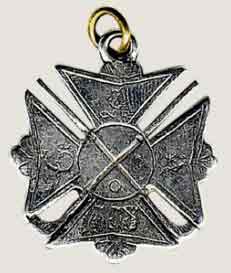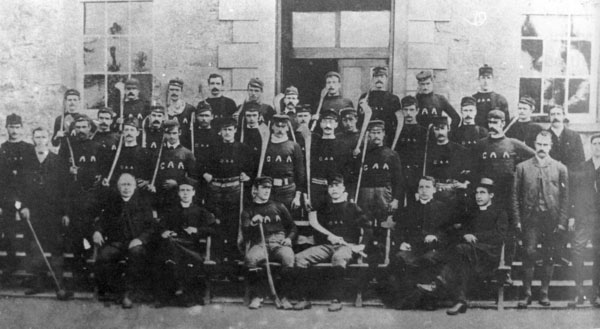A rare Co.Tipperary GAA medal, commemorating the first ever GAA hurling match in America is to be auctioned on Thursday, July 29th, at Mealy’s auctioneering premises in Castlecomer, Co Kilkenny. This is the first medal ever to go on sale from the GAA’s first official trip to the United States in 1888.
1888 was the year that the Gaelic Athletic Association organised a trip to New York for hurlers and with the view of strengthening the interest of the exiles in their native pastime, but more importantly to raise funds for the hosting of a ‘Celtic Festival’ or ‘Tailteann Games‘ (An Aonach Tailteann).
The medal soon to be auctioned is, we understand, presently is in the ownership of as yet an unnamed Tipperary family.
Five players from Tipperary were included in this group of 51 persons, dubbed “The Invaders” or Invasion Tour and included members of the Tipperary team who had won the previous year’s inaugural All-Ireland Hurling final.
It is understood that only 39 of these silver medals, in the shape of a ‘crosse pattée‘ featuring a design of crossed hurley’s in the centre, were originally distributed. An interesting fact is that when “The Invaders” tour left America on October 31st 1888, its original number had fallen somewhat from the original 51 returning home, with 17 men at least choosing to remain in America permanently.
In 1888 the idea of hosting this ‘Celtic Festival’ was discussed and plans were put in place to hold this festival in Dublin in the Summer of 1889. This festival was to include athletic contests, field games, an Irish industrial exhibition and traditional music /literary competition. The estimated cost of hosting such a festival was estimated at £5,000.
To raise necessary funding it was planned that a group of Irish hurlers and athletes would embark on a fundraising tour of strongly inhabited Irish centres in America staging displays of hurling and athletics. While the process of selecting hurlers and athletes to accompany the tour began, £1,000 had to be raised through a nationwide fundraising campaign to cover players fares and each of the 800 or so affiliated clubs were asked to contribute a small amount.
However, the fall-out from the 1887 split and the renewed influence of the Irish Republican Brotherhood, now meant that some counties like Limerick, Cork and Galway refused to nominate any hurlers. In the end 25 hurlers were chosen with both Tipperary and Dublin contributing 5 players each and the selection of the 18 athletes to travel was considered straightforward.
Funds for this planned tour were slow to materialise, so to help raise funds Maurice Davin decided to bring the group together a week before the departure date and hold a number of exhibition fund-raising games in Dublin, Wexford, Dundalk, Kilkenny, Tipperary and Cork.
The tour departed eventually on the 16th of September 1888, visiting Irish areas in Boston, New York, Philadelphia, Trenton, Patterson, Newark, Providence and Lowell with a tumultuous welcome received. Ultimately the trip, from a financial point of view, was considered a failure due to disputes between the two rival American athletic bodies, namely the National American Athletic Association (NAAA) and the Amateur Athletic Union (AAU). Poor gate receipts, bad weather and bitter disputes resulted in patron Michael Davitt personally advancing £450 of his own funds, just to meet the travel and accommodation bill of this group.
The aim of the tour was to raise £5,000 for the staging of the Tailteann Games in 1889. To this aim the tour must be considered a total financial failure and it would be now 34 years before any idea of staging these ‘Tailteann Games’ would be ever raised again.



Leave a Reply